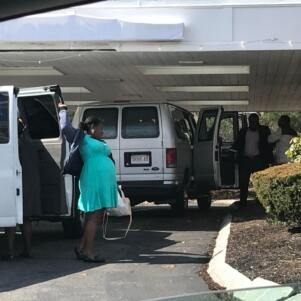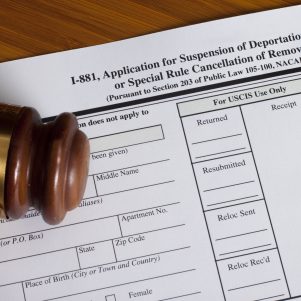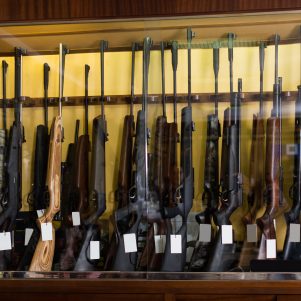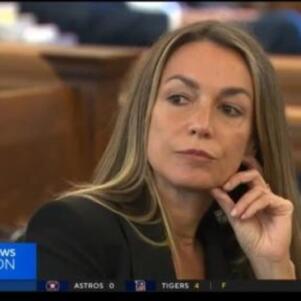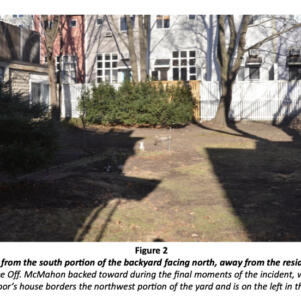Springfield Joins Ranks of Sanctuary Cities, Over Objections of Mayor
By Matt McDonald | January 15, 2019, 2:14 EST
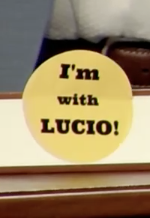 This sticker on the nameplate of Springfield city councilor Adam Gomez commemorates an illegal immigrant who is taking sanctuary in a church in the town of Amherst, Massachusetts. Gomez referred to it while speaking in favor of a sanctuary-city ordinance for Springfield.
This sticker on the nameplate of Springfield city councilor Adam Gomez commemorates an illegal immigrant who is taking sanctuary in a church in the town of Amherst, Massachusetts. Gomez referred to it while speaking in favor of a sanctuary-city ordinance for Springfield.
Springfield city officials can’t ask people about their immigration status and Springfield police can’t cooperate with federal immigration authorities unless they have a warrant under a new local ordinance approved by the city council.
The council overrode a veto by Mayor Domenic Sarno on Monday night, enacting the so-called “Welcoming Community Trust Ordinance.”
The council voted 10-1 to override the veto, more than the two-thirds needed. The result was expected, since the council approved the ordinance 10-3 on December 17, before the mayor vetoed it.
The new ordinance includes the following provisions:
“A. A city official shall not question persons they encounter about their immigration status unless such inquiry is required by state or federal law or to provide a public benefit. Nothing in this subsection shall prohibit the Springfield Police department from using other investigatory tools to establish information about a suspect of crime.”
…
“F. A city official shall honor judicial warrants, but shall not respond to an ICE request for notification about the incarceration status or pending release of a person in custody, including a request pursuant to federal form I-247N, I-247A, or I-247X or provide ICE with information about the home address, work address, or phone number of a person in custody.”
Supporters of the ordinance say it offers needed protections to vulnerable people and promotes trust between illegal immigrants and local police. Opponents say it burdens the city, jeopardizes federal grants if the Trump administration eventually prevails in its bid to cut off federal funds to so-called sanctuary cities, and may attract crime.
City councilor Adam Gomez, a sponsor of the ordinance, spoke directly to supporters in the audience of the city hall chamber Monday, January 14.
“I think this override means so much to a demographic of … people that feel so hopeless and helpless. And I hope that moving forward, that this makes Springfield safer and makes sure that we can move forward and start working on the rest of our community. So thank you all of you for coming. You guys and appreciated and loved. And on to the next one,” Gomez said, according to a video posted on the city’s local cable-access station’s web site.
Councilors addressed the matter only briefly Monday night, having discussed it at length during a meeting December 17.
That night last month, Gomez made a reference to the proposed border wall at the center of the partial federal government shutdown.
“Yeah, of course I’m going to build a wall. I’m going to build a wall of protection around these people that are the voices of the voiceless,” Gomez said December 17. “I’m going to build a wall around bigotry, and the ones that stand with bigotry. I’m going to build a wall around the ones that walked in and looked me in the face today and told me, ‘Build a wall.’ … Really disrespectful.”
Gomez identified the ordinance as sticking it to President Donald Trump.
“Because this protection order is going to protect people, and one thing that they’re going to remember, is they’re going to remember your legacy, and this is part of your legacy. This is part of dumping the Trump. This is really part of dumping the Trump,” Gomez said December 17. “This is part of, ‘yes, we’re municipal government, but we have a responsibility to our constituency.’ … I have nothing to gain, because they don’t even have the service of being able to vote, but if we stand with our privilege and show and protect people that can’t protect themselves, that are vulnerable, it shows character.”
Gomez suggested that supporting the sanctuary-city ordinance might help him get into Heaven.
“And I’m not going to put faith in it, but I’m going to say: By almighty God, if this buys me a place, thank you, God. Thank you, Jesus. Amen,” Gomez said December 17, to applause from some in the audience.
City councilor Timothy Ryan, who also supported the ordinance, on December 17 read a portion of the Peace Prayer of St. Francis of Assisi that begins, “Where there is hatred, let me sow love …”
Councilor Kenneth Shea was the lone vote against the ordinance Monday, January 14.
The problem with it, he said during the meeting last month, is that it attracts illegal immigrants who are inclined to commit crimes to come to sanctuary cities like, now, Springfield.
“That is what the citizens of Springfield that you claim are upset or not responsible are concerned about. They’re not concerned about the people that are behaving themselves and trying to get by and make a living,” Shea said December 17.
The sanctuary ordinance also encourages lawlessness more generally, he said.
“One of the problems that we face here, no matter how you slice this, is we are setting a precedent in which there are some laws which we, because we don’t like them and we think they’re unfair, that we decide not to follow them, or we’re going to decide not to follow them. And a democracy of self-government — O.K.? — presupposes that we have fidelity to the law, even when we disagree with it. Were it otherwise, self-government would dissolve into anarchy. And we’re free to attempt to change those laws, through persuasion and argument to the electorate, and to make changes in the law. But we’re not free to do is to ignore the law and say that there’s some laws, they’re inconvenient, we’re not going to follow them. Because that tends to set a pattern,” Shea said December 17.
The Springfield City Council has 13 members. It takes nine to form a two-thirds majority needed to override a mayor’s veto.
The 10 city councilors who voted yes on Monday, January 14 were Orlando Ramos (council president), Justin Hurst (council vice president), Adam Gomez, Michael Fenton, Melvin Edwards, E. Henry Twiggs, Marcus Williams, Tracye Whitfield, Jesse Lederman, and Timothy Ryan.
The one city councilor who voted no on Monday, January 14 was Timothy Allen.
During the council meeting December 17, city councilors Kenneth Shea and Kateri Walsh also voted no. They did not attend the council meeting Monday, January 14.
Springfield is a city of about 153,000 people in western Massachusetts. It is the third largest city in the state, after Boston and Worcester.
In July 2017, the Massachusetts Supreme Judicial Court ruled in Lunn v. Commonwealth that state law does not allow state authorities to hold a person on a federal civil detainer, which is a request by the federal Immigration and Customs Enforcement agency to hold a person to allow time for ICE agents to pick up the person for possible deportation.
But sheriffs in Barnstable County, Plymouth County, and Bristol County cooperate with federal immigration authorities. At each county jail, sheriff’s department staff members access the ICE database to identify illegal immigrants among recent inmates, and they notify ICE of their presence.
A bill to make Massachusetts a so-called sanctuary state – which would stop all cooperation with ICE by state and local law enforcement officers except in cases where federal law demands it — failed in the state legislature last year, but it is expected to be resubmitted this month for the new legislative session that began two weeks ago.

